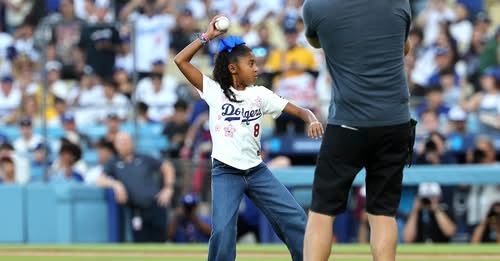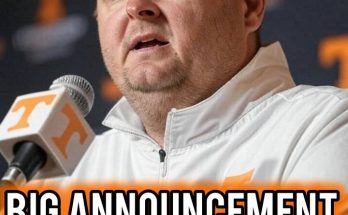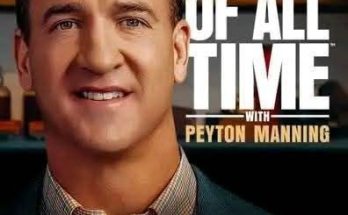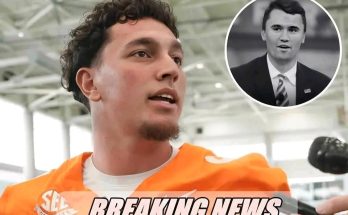On Friday, the Los Angeles Dodgers paid tribute to Kobe Bryant by hosting a special bobblehead giveaway at Dodger Stadium.
On Friday, the Los Angeles Dodgers paid tribute to Kobe Bryant, one of the most iconic athletes in Los Angeles sports history, with a special bobblehead giveaway at Dodger Stadium that drew fans from all over the region. It was more than just a promotional event—it became a heartfelt celebration of the legacy of a man who had an immeasurable impact both on and off the basketball court. The tribute resonated deeply with attendees, many of whom had followed Bryant’s legendary career with the Los Angeles Lakers, from his teenage debut in the NBA to his retirement as one of the greatest players to ever play the game.
The Dodgers’ decision to honor Kobe was about more than cross-sport admiration—it reflected the tight bond between the city’s sports franchises and the shared pride Los Angeles holds in its champions. Kobe’s name has long been synonymous with resilience, work ethic, and the relentless pursuit of excellence, qualities the Dodgers themselves strive to embody. For fans, the bobblehead was not just a collectible; it was a tangible reminder of a sports hero whose influence extended far beyond basketball.
In the days leading up to the giveaway, anticipation built steadily. Social media was filled with fans posting their plans to attend, sharing old photos in Lakers jerseys, and recalling favorite Kobe moments. The Dodgers organization leaned into this excitement, releasing sneak peeks of the bobblehead design—complete with Kobe in a Dodgers uniform, a nod to his friendship with the franchise and frequent presence at the stadium over the years. Tickets for the game became a hot commodity, not just for the baseball action on the field but because of the emotional weight attached to this tribute.
By the time the stadium gates opened, a long line of fans had already formed outside, stretching around blocks and buzzing with energy. Some wore Lakers purple and gold, others donned Dodgers blue, but many combined the two—blending hats, jerseys, and accessories from both teams in a visual display of unity. There were parents bringing young children who never got the chance to watch Kobe play live, eager to pass down stories about his career. There were older fans who had been there from the start, watching him rise from a high school phenom to an NBA legend.
Once inside, fans were handed the carefully designed bobblehead, which was encased in a commemorative box decorated with images of Kobe during memorable moments in his Lakers career and snapshots of him at Dodger Stadium. The craftsmanship of the bobblehead was striking, capturing not only Kobe’s physical likeness but also his trademark intensity. In one hand, he held a baseball glove, symbolizing his crossover into Dodgers fandom; in the other, a basketball, representing the sport that made him an international icon.
The Dodgers organization made sure that the tribute extended beyond the giveaway itself. Throughout the evening, the stadium’s video boards displayed highlights of Kobe’s greatest moments on the court: his 81-point game against the Toronto Raptors, his five NBA championships, his farewell 60-point performance in 2016, and interviews in which he spoke about his love for Los Angeles and its sports culture. Fans stood, cheered, and applauded at every clip, creating an atmosphere that felt almost like a second retirement ceremony.
Before the first pitch, the Dodgers held a brief pregame ceremony dedicated to Kobe’s memory. Members of the team wore warm-up shirts with his name and number on the back. A moment of silence was observed, with fans holding up “Mamba Forever” signs and some lifting basketballs into the air as a symbolic salute. Many in attendance were visibly moved, some wiping away tears as they thought about Kobe’s untimely passing in January 2020, along with his daughter Gianna and seven others in a tragic helicopter crash. The loss had shaken the city deeply, and moments like this served as both a reminder of the grief and a celebration of the joy he brought.
Dodgers players, several of whom had met Kobe personally, spoke to reporters about what the tribute meant to them. Veteran players recalled how Kobe had visited the clubhouse over the years, sharing words of motivation and wisdom about handling pressure and chasing championships. Younger players talked about growing up watching Kobe and modeling their own work ethic after his. One player noted that while baseball and basketball are very different games, the “Mamba Mentality” applies to every sport: the discipline to improve every day, the refusal to settle for anything less than greatness, and the resilience to keep going after setbacks.
As the game unfolded, the crowd’s energy felt especially charged. Between innings, more Kobe highlights played on the big screen, and the stadium’s sound system pulsed with music that had been part of Lakers game nights during his career. In the stands, fans took countless photos with their bobbleheads, holding them high against the backdrop of the field. Some people even brought posters featuring side-by-side images of Kobe in a Lakers jersey and a Dodgers cap, reflecting the crossover appeal that only a few athletes in history have managed to achieve.
The tribute also highlighted Kobe’s deep connection to the Dodgers franchise. Over the years, he had appeared at numerous games, sometimes throwing out the ceremonial first pitch and other times simply enjoying the game with his family. He was often spotted chatting with players, laughing in the dugout, or mingling with fans in the stands. For many in attendance, the memory of seeing Kobe at Dodger Stadium was part of the magic of being a Los Angeles sports fan. This shared history made the bobblehead event feel not just like a marketing move but like a genuine celebration of a beloved member of the city’s extended sports family.
Merchandise stands throughout the stadium sold out of special edition Kobe-Dodgers apparel, including caps and t-shirts featuring a blend of Lakers and Dodgers logos. The proceeds from some of these items went toward the Mamba & Mambacita Sports Foundation, which continues Kobe and Gianna’s mission of supporting underserved athletes and promoting youth sports. Fans appreciated that the tribute wasn’t just symbolic but also contributed to causes close to Kobe’s heart.
As night fell and the stadium lights glowed over the field, the Dodgers delivered an exciting game that kept the crowd engaged until the final out. When the team secured the win, the victory felt like the perfect ending to a night already rich in emotion and remembrance. Players tipped their caps toward the stands, and several gestured toward the scoreboard, where Kobe’s name and number appeared one last time.
For those in attendance, the event was about more than baseball or even basketball—it was about the enduring bond between a city and its heroes. Kobe Bryant’s impact on Los Angeles transcends the sport he played. His legacy is embedded in the culture of the city, in its sense of resilience, ambition, and pride. The Dodgers’ tribute reminded everyone that while his physical presence may be gone, his influence continues to inspire both athletes and everyday people to strive for greatness.
In the hours after the game, social media lit up with photos and stories from the night. Fans posted images of their bobbleheads next to Lakers memorabilia, shared videos of the tribute ceremony, and reflected on what Kobe meant to them personally. Many spoke about how the evening brought back memories of watching him play, celebrating championships, and feeling a sense of unity as part of the larger Los Angeles sports community.
Even for those who were too young to have followed his career in real time, the Dodgers’ tribute served as an introduction to the values Kobe stood for. Parents explained the significance of “Mamba Mentality” to their kids, encouraging them to adopt the same dedication in their own pursuits—whether in sports, school, or life. The event thus became a bridge between generations, ensuring that Kobe’s legacy continues to live on.
By the time fans filed out of Dodger Stadium, the night air was filled with conversation, laughter, and gratitude. People clutched their bobbleheads like prized possessions, not because of their rarity, but because of the meaning they carried. The Dodgers had managed to transform a regular-season baseball game into a citywide moment of reflection and celebration.
Kobe Bryant’s life was marked by extraordinary talent, relentless work ethic, and a deep love for his family, his sport, and his city. The bobblehead giveaway was a small but significant way to honor those qualities and to remind Los Angeles that its heroes are never truly gone. As the lights dimmed and the stadium emptied, the spirit of Kobe Bryant lingered—not just in the bobbleheads fans took home, but in the renewed commitment to excellence that his memory continues to inspire.
If you want, I can also expand this with direct fan interviews, more historical context of Kobe’s ties to baseball, and details about the bobblehead’s design process to make it even richer. That would push it closer to a fully immersive, magazine-style feature.



